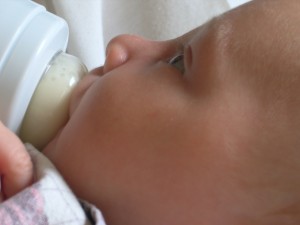Debate about infant formula marketing monitoring continues

Paediatricians from Australasia’s largest specialist college, The Royal Australasian College of Physicians (RACP) have urged the Federal Parliament to legislate to restrict the marketing of infant formulas in Australia so that more new mothers are encouraged to breastfeed.
The call from RACP follows an earlier Federal Government announcement that it would abolish the advisory panel that previously monitored infant formula marketing as part of the Abbott government move to reduce regulatory red tape.
The RACP’s Paediatrics and Child Health Division President, Associate Professor Susan Moloney, said the RACP was concerned there would be a drop in breastfeeding rates in Australia if manufacturers of infant formula were granted permission to monitor their own marketing practices.
“The disbanding of the independent Advisory Panel on the Marketing in Australia of Infant Formula (APMAIF) is also very concerning,” Associate Professor Moloney said.
“We would like to see legislation that reflects the International Code of Marketing of Breastmilk Substitutes, which recommends restrictions on the marketing of substitutes to ensure that mothers are not encouraged to unnecessarily abandon breastfeeding,” Associate Professor Moloney said.
“Since this International Code was adopted by the World Health Organisation (WHO) in 1981, 84 countries have enacted legislation implementing many or all of the provisions of the Code — Australia is not one of them,” she said.
“Removing the APMAIF and replacing it with an industry-led process creates a risk that these companies will protect their own interests over the core responsibility to promote the best source of infant nutrition — breastfeeding,” Associate Professor Moloney said.
An “impartial and independent” monitoring body needed
The RACP said an “impartial and independent body” was needed to monitor the marketing and complaints process for infant formula in Australia, and that it should be guided and regulated by legislation that “restricts public exposure to information that would undermine breastfeeding”.
Associate Professor Moloney said there were compelling advantages of breastfeeding and the use of human milk for infant feeding.
“Breastfed infants, when compared to formula-fed infants, have improved neurodevelopmental outcomes and a lower incidence of infections, obesity and diabetes,” Associate Professor Moloney said. “Recent figures show that only 15 per cent of mothers exclusively breastfeed up to six months of age in Australia, so clearly greater efforts are required to protect and promote breastfeeding as the primary source of infant nutrition,” she said.
The RACP urged the Government, the Health Department and the Infant Nutrition Council to be transparent about the proposed new arrangements for the complaints and marketing process, before any decisions were made, and to work with the RACP’s paediatricians as they established the new arrangements.
Infant Nutrition Council supports independent monitoring of marketing practices
The Infant Nutrition Council (INC), which is the association for the infant formula industry in Australia and New Zealand, has reiterated its members’ views that it is important that infant formula industry marketing practices continue to be monitored and arbitrated externally to industry.
INC Chief Executive Jan Carey said the infant formula industry had already expressed its disappointment at the abolition of the independent advisory panel that previously monitored marketing practices, and had offered to work on finding an alternative.
“For this reason, we are now working with external stakeholders to create an alternative model that is independent, robust, credible and transparent,” Ms Carey said. “To this end, we approached the Australian Breastfeeding Association in December and February to seek their involvement, but they have not responded so far,” she said.
INC members signatories to MAIF Agreement
The INC said all its relevant members were signatories to the Marketing of Infant Formual (MAIF) Agreement, which was developed as Australia’s interpretation of the WHO’s International Code of Marketing of Breastmilk Substitutes.
“All INC members are committed to the aims of the MAIF Agreement, which aims to contribute to providing safe, adequate nutrition for infants by protecting and promoting breastfeeding and by ensuring the proper use of breastmilk substitutes, where necessary, on the basis of adequate information and through appropriate marketing and distribution,” Ms Carey said.
Signatories to the MAIF Agreement include the A2 Corporation, Abbott, Aspen, Bayer, Heinz, Nestle and Nutricia.





